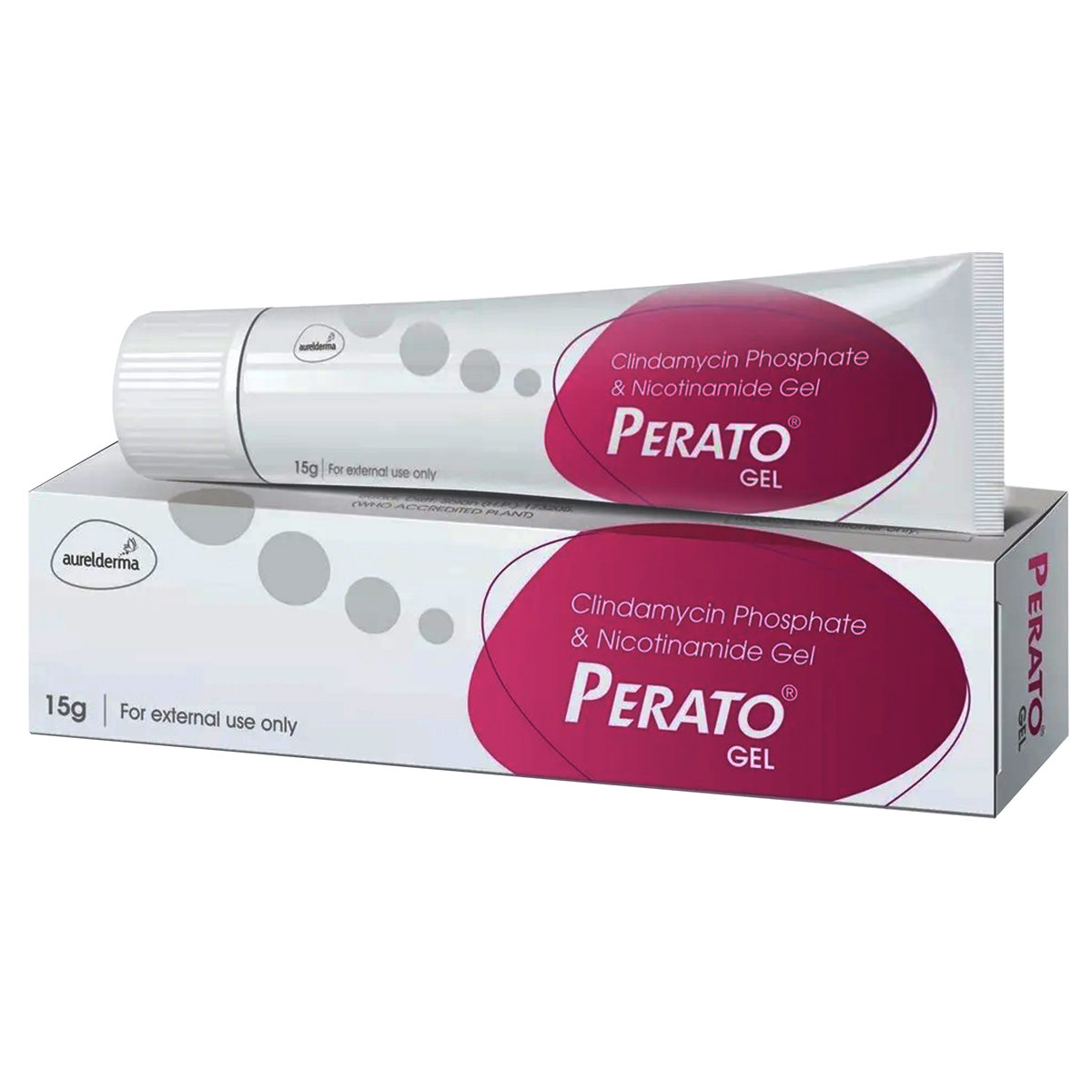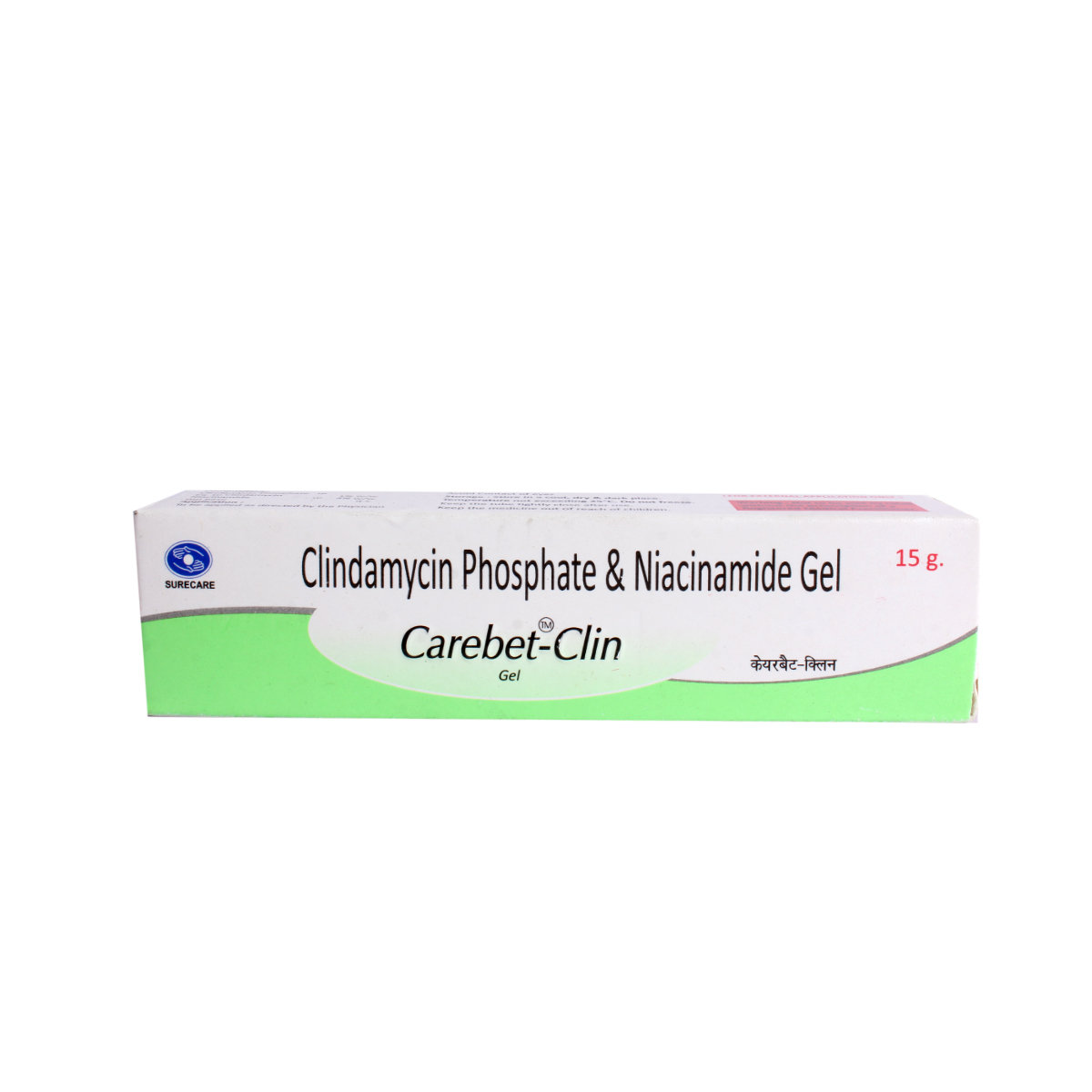Clindamycin+nicotinamide
About Clindamycin+nicotinamide
Clindamycin+nicotinamide belongs to the class of antibiotic known as lincomycin antibiotics that works by preventing or stopping the bacterial growth. This combination medicine is primarily used to treat inflamed acne. It minimizes the formation of excessive natural oil known as sebum. It also reduces swelling caused due to acne. Acne is a skin related problem in which oils glands (sebaceous gland) of the skin become clogged, thereby forming pimples and sometimes cysts.
Clindamycin+nicotinamide is composed of two medicines namely: Clindamycin and Nicotinamide. Clindamycin is a lincomycin antibiotic that acts by penetrating inside the skin and helps in killing the acne-causing bacteria. On the other hand, Nicotinamide is a form of vitamin B which is responsible for exerting anti-inflammatory effects that are applied to the skin. Together it helps to reduce the swelling, redness and tenderness caused due to acne or pimple. Besides this, it also prevents the formation of pimples, blackheads and whiteheads on the skin.
Clindamycin+nicotinamide should be used in the quantity advised by the doctor. It is only meant for external use. It should be applied in sufficient quantity enough to cover the affected area. Wash your hands before and after using this medicine. If accidentally it gets in contact with your eyes, nose, mouth or any other sensitive areas, immediately rinse it with water. In some cases, you may experience irritation, dryness, peeling, redness and burning sensation at the application site. Most of these side effects of Clindamycin+nicotinamide do not require medical attention and gradually resolve over time. However, if the side effects are persistent, reach out to your doctor. It is advised to use a skin moisturizer and drink plenty of water to prevent side effects.
Do not stop using this medicine without consulting your doctor. Inform your doctor if you are pregnant or breastfeeding. Also, if you are allergic to this medicine, please tell your doctor. Avoid touching, picking or scratching the infected area to avoid worsening of the acne. It is advised to avoid unnecessary sun exposure and before stepping out in the sun, use sunscreen. Do not use any kind of cosmetic products or get any cosmetic procedures done in the affected area without consulting your doctor.
Uses of Clindamycin+nicotinamide
Medicinal Benefits
Clindamycin+nicotinamide is made of Clindamycin and Nicotinamide (Vitamin B3). Clindamycin is a well-known bacteriostatic antibiotic that treats acne, bacterial infection, scars suitable for both dry and wet skin. Topical application of clindamycin helps in the healing of acne by killing the acne-causing bacteria and prevents further bacterial skin infections. Nicotinamide is a synthetic form of Vitamin B3, that stimulates ceramide (fats found on the uppermost layer of the skin) synthesis and improves the epidermal permeability barrier functions, making skin look supple and soft.
Directions for Use
Storage
Side Effects of Clindamycin+nicotinamide
- Irritation
- Dryness
- Peeling
- Redness
- Burning sensation at the application site
Drug Warnings
Clindamycin+nicotinamide is meant for only topical use only and not for oral, ophthalmic or intravaginal use. You should not use a Clindamycin+nicotinamide if your skin is very sensitive or allergic to Clindamycin+nicotinamide or lincomycin class antibiotic. Do not apply Clindamycin+nicotinamide on the cut, scraped, sunburned or eczema-affected skin part. Accidently Clindamycin+nicotinamide gets into your eyes, immediately rinse your eyes with water thoroughly and contact your doctor immediately if the irritation persists. Inform your doctor if your skin conditions do not improve. Clindamycin+nicotinamide may take time to treat acne, so do not apply dosage more than prescribed for better and faster results. If you are pregnant, planning for pregnancy or a nursing mother, consult your doctor before using Clindamycin+nicotinamide. If you are using other dermatological products other than Clindamycin+nicotinamide it may lead to unfavourable results like excessive drying of the skin, peeling, irritation, etc. In this case, consult your doctor whether how much medicines should be used for the treatment of acne.
Drug Interactions
Drug-Drug Interaction: This medicine may have an interaction with antibiotics (clarithromycin, rifampin, erythromycin), anti-HIV drug (indinavir, nelfinavir, ritonavir), antifungals (itraconazole, ketoconazole) and antidepressant (nefazodone). Besides this, Clindamycin+nicotinamide should not be given with muscle relaxants like atracurium, cisatracurium, doxacurium, metocurine, mivacurium, pancuronium, pipecuronium, rapacuronium, rocuronium, succinylcholine, tubocurarine and vecuronium.
Drug-Food Interaction: Avoid fried food or oil food.
Drug-Disease Interaction: You should not use Clindamycin+nicotinamide if you have ulcerative colitis, enteritis (inflammation of intestines) or severe diarrhoea caused by antibiotic medicine. People with colitis should avoid using Clindamycin+nicotinamide as it may cause severe, persistent diarrhoea and severe abdominal cramps with the passage of blood in stool or mucus.
Drug-Drug Interactions Checker List:
Safety Advice

Alcohol
safe if prescribedThere are no interactions found with Clindamycin+nicotinamide pertaining to alcohol. However, it is advised to avoid alcohol for a speedy recovery.

Pregnancy
cautionThere are no well-established clinical studies with Clindamycin+nicotinamide in pregnant women. Hence, Clindamycin+nicotinamide should be used during pregnancy only if clearly needed. Consult your doctor before taking this medicine.

Breast Feeding
cautionClindamycin+nicotinamide is safe to use in breastfeeding. However, please inform your doctor that you are breastfeeding if you are prescribed Clindamycin+nicotinamide.

Driving
safe if prescribedThere are no effects found of Clindamycin+nicotinamide on driving capabilities.

Liver
cautionThere are no interactions found with Clindamycin+nicotinamide pertaining to the liver. However, please inform your doctor if you are suffering from or have suffered from liver diseases.

Kidney
cautionThere are no interactions found with Clindamycin+nicotinamide pertaining to the kidney. However, please inform your doctor if you are suffering from or have suffered from kidney diseases.

Children
safe if prescribedClindamycin+nicotinamide should be used in children only if prescribed by a specialist. The safety and effectiveness of Clindamycin+nicotinamide have not been established in children below 12 years of age.
Habit Forming
Diet & Lifestyle Advise
- Avoid fried food or oil food and drink plenty of water
- It is advised to avoid unnecessary exposure to the sun.
- In case, it is necessary to go out in the sun, use sunscreen.
- Do not itch or scratch the infected area.
- Use moisturizer to prevent the occurrence of side effects
- Exercise regularly to reduce stress
Special Advise
Clindamycin+nicotinamide is for external use only and contact should be avoided from the eyes and mucous membranes, including those of the nose and mouth. In case of excessive dryness, irritation or peeling of the skin, please consult your doctor.
Patients Concern
Disease/Condition Glossary
Acne or acne vulgaris is a long-term skin problem caused when hair follicles become plugged with oil and dead skin cells. It leads to the formation of blackheads, whiteheads, pimples, oily skin and a scar on the uppermost layer of the skin (epidermis).
FAQs
The precautions which should be taken while using Clindamycin+nicotinamide are to avoid showering/bathing for at least 1 hour after the application. Avoid contact of Clindamycin+nicotinamide with eyes and mucous membranes. Other topical products such as cosmetics, lotions, insect repellants, moisturizers or other topical medications should be avoided. Avoid unnecessary exposure to the sun and in case you have to go out in sun, apply sunscreen.
It is advised to keep and store this medicine in the container or the pack in which it came in and keep it tightly closed. Keep away from pets, children and other people.
Clindamycin+nicotinamide may take up to 2-3 weeks to show its effect. Use it as per the directions given by your doctor. In case there is no improvement in the symptoms, please consult your doctor.
Clindamycin+nicotinamide should be used in children only if prescribed by a child specialist. The safety and effectiveness of Clindamycin+nicotinamide have not been established in children below 12 years of age.






